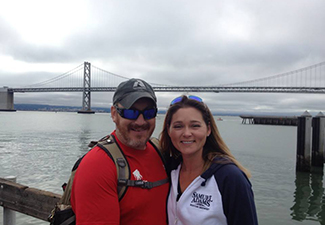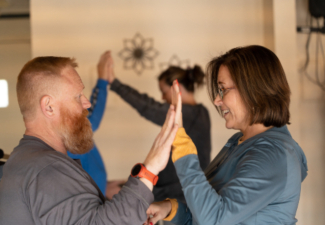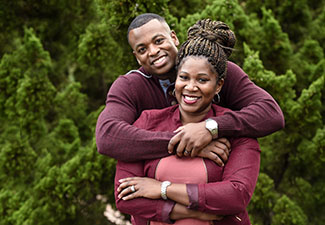Through It All: Military Couple's Love Story Defies Odds

Melissa Krabbe never gave much thought to what it would mean to be a military spouse. With few military ties in her family, it wasn't on her radar. When she met Phil Krabbe, the notion of military life seemed distant. Eventually, they married, had a child, and settled into a comfortable, day-to-day routine.
Then came Sept. 11, 2001. The attacks on 9/11 changed the nation and profoundly impacted Phil and Melissa's lives. In the aftermath, Phil felt compelled to serve the country and joined the U.S. Marine Corps. The decision would be a source of pride and honor for both Phil and Melissa, but it also created overwhelming obstacles they couldn't foresee.
Phil did three back-to-back deployments to the Middle East. You might think everything would return to normal when Phil left the service, but for veterans, particularly those who serve in combat, it's rarely that simple.
Melissa was unprepared for life as a military spouse but being the wife of a wounded combat veteran presented an entirely different set of challenges.
However, with support from others, including Wounded Warrior Project® (WWP), and Phil and Melissa's love and dedication to one another, they were able to find a new normal and rebuild their lives together.
The Wounds of War

Phil and Melissa during Phil's time serving in the U.S. Marines.
Phil's first deployment to the Middle East was relatively uneventful, but before his second deployment, out of nowhere, Phil asked for a divorce. He told Melissa it was his way of protecting her and allowing her to move on because he didn't think he was coming home.
She said no.
Phil did return from that deployment, at least physically. But Melissa could see he was different; angrier and drinking more. After his third deployment, there was no denying that something was wrong.
"There were a lot more casualties, and one of them was a close friend of his," Melissa said. "After that [deployment], we really started noticing that something was going on, but he was busy taking care of his fellow Marines, so it was hard to know what to do or how to do it."
Melissa saw the changes, but like many veterans, Phil wasn't talking about what was going on with him or how he was feeling. Despite being surrounded by his family, he missed the camaraderie he found in the Marines. He was also dealing with the symptoms of post-traumatic stress disorder (PTSD), traumatic brain injury (TBI), and survivor's guilt. To mask the pain, Phil was taking pills and abusing alcohol.
"I was an alcoholic," Phil said. "I was a drug addict, too. I tried to cope the only way I knew how, just to be able to function during the day."
Phil's way of coping also took a toll on Melissa. She felt exhausted, emotionally drained, and unsure how to help.
"There were some days where it was like my body just had to stop," Melissa said. "I just need to sleep. I was kind of all over the board with it. Most of my days were completely stressful, and I didn't have any time to think about myself. I was making sure everybody else was good."

Melissa wasn't quite sure how to help Phil when he left the military with PTSD and survivor's guilt, but she wasn't going to quit trying.
A friend introduced Phil to WWP™, but he doubted they could help. He was invited to attend a multi-day WWP summit but didn't want to go because he knew he couldn't drink. Melissa insisted he not miss this opportunity. That event was a turning point in Phil's life. There, Phil met fellow warrior Ray Pizarro, who would profoundly impact his life. Ray asked Phil to promise to keep fighting, no matter the obstacles. As a reminder, Phil got the words "courage, forgiveness, pain, sacrifice" tattooed on his left hand.
Although Phil started to connect with other veterans, he was not addressing his depression and PTSD. He was also still self-medicating with drugs and alcohol and pulling away from his family.
One day in November 2020, Phil decided he'd had enough. He hadn't been sleeping, and the drugs and alcohol weren't numbing the pain anymore. As Phil was about to take his life, he saw the tattoo on his hand and remembered his promise to Ray. That moment became the catalyst for Phil's recovery and his renewed relationship with Melissa.
"I truly think that Ray was the one who got [Phil] where he needed to be," Melissa said. "I could tell him all of the things, but Ray had been there. They could talk about things that Phil wouldn't share with me, and he needed that. Ray was an angel, and that's what he needed. And I'm thankful for [Ray] every day because he was there at the right time."
Closing the Wounds
After coming so close to taking his life, Phil realized he needed intensive help. Without telling anyone, he drove to the local Veterans Affairs (VA) medical center and explained what happened. Phil immediately went into treatment and struggled with the effects of coming off alcohol and drugs. He didn't speak to anyone during that time, including Melissa.

Programs from Wounded Warrior Project helped Phil better manage the symptoms of his PTSD, enabling the family to reconnect.
Melissa wanted to intervene and fix everything but knew he needed space to figure things out for himself.
"I wanted to help him do everything and make sure everything was good," Melissa said. "I could tell him all the things that he needed to do and to say, but I couldn't do it for him."
When Phil returned from that treatment, he was no longer drinking, but he "was just there, just surviving," Melissa said.
"That was hard, too, because there was no emotion. It was almost harder to have nothing than have the anger," she said.
Things really started to improve after Phil participated in Warrior Care Network®, an accelerated mental and brain health program hosted by four leading academic medical centers. This program supports veterans, service members, and their families to heal from the disruptive effects of PTSD, TBI, substance use disorder, and other related conditions.
"It changed my life drastically," Phil said. "I didn't know how to explain how I felt. Warrior Care Network helped me better explain what I was going through."
Healing the Wounds

Melissa and Phil, a U.S. Marine Corps veteran, attend a Metallica concert in Minneapolis, Minnesota in August 2024.
With Phil's recovery on the right path, Melissa realized she needed help dealing with all the emotions she repressed while caring for her family.
"Once Phil was in a good place, I ended up going to the doctor myself for a couple of different things. It was like my body was finally like, 'OK, he's good. Your turn,'" Melissa said.
She also recognized that, like Phil, she needed peer support and connections with others who could understand what she was going through. Melissa started participating in a virtual a group called Wounded Warrior Project Coffee Talk, which included warriors with PTSD and their spouses.
"There are so many hats to wear. It's hard to take one off and put another on," Melissa said about being a military spouse. "Pretty soon, you're wearing them all at the same time. … You do need to make room to take care of yourself. That's probably the most important part: making time for yourself.
Melissa and Phil further solidified their relationship and connection by attending a couples Project Odyssey. This 12-week WWP mental health program allows injured veterans and their significant others to develop skills to improve their relationships.
"It helped us reconnect because, obviously, we have been through a lot," Phil said. "First off, it helped me say, 'I am sorry this happened. I am sorry you had to go through this. I appreciate you for sticking with me. I appreciate you for not leaving me.'"
Even during the toughest moments, Melissa knew the Phil she fell in love with was still there. The wounds of war were real and had changed Phil, but their love for each other was just as real. Their dedication to weather the storm together and their resilience to not give up is a testament to the power of love and the realization that they're stronger together.
At some points, during the darkest moments, some of Melissa's friends would ask her why she didn't just leave. But the thought never crossed her mind.
"I knew who he was before he joined the Marine Corps, and, at home, I still got to see that person every once in a while," Melissa said. "When we weren't in total PTSD and angry [mode], there was a smile now and then. So, I wasn't going to give up. I knew he was in there, and we were worth fighting for."
It's a fight they're both winning.
Find out how WWP serves military families.
Contact: — Paris Moulden, Public Relations, pmoulden@woundedwarriorproject.org, 904.570.7910
About Wounded Warrior Project
Since 2003, Wounded Warrior Project® (WWP) has been meeting the growing needs of warriors, their families, and caregivers — helping them achieve their highest ambition. Learn more.



